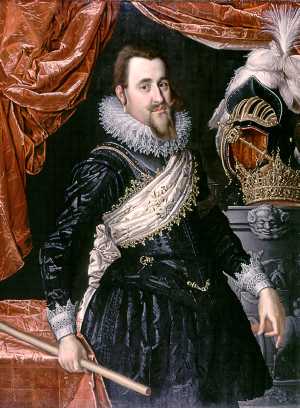 SKC Films Library |
| SKC Films Library >> General and Old World History >> Northern Europe >> Denmark >> 1523-1670 |
| Christian IV King of Denmark and Norway, 1588-1648
Christian was born at Fredriksborg Castle on April 12, 1577, the son of Frederick II, King of Denmark, and Sophia of Mecklenburg. He succeeded to the throne upon the death of his father, on April 4, 1588. During his minority, which lasted until August 17, 1596, the government was carried on by a regency of four. Major Events of His Reign Development of the Danish Navy At the time of Christian's majority the Danish Navy consisted of 22 ships; by 1610 that number had risen to 60. The Danish Army was also organized during this period. Kalmar War (1611-1613) Christian's first experiment with his newly organized army was a campaign against Sweden. The chief operation of this war was the Danish capture of Kalmar, the easternmost fortress of Sweden. King Gustavus Adolphus of Sweden was compelled to give way on every essential point at the resultant Treaty of Knäred (January 20, 1613). Development of Overseas Trade Denmark's first overseas colony was established by the Danish East India Company at Trankebar, on India's southeast coast, in 1620. Campaign Against Germany Christian used the chaos of the Thirty Years' War to obtain control of the Elbe and Weser rivers, and to acquire the secularized German bishoprics of Bremen and Werden for his sons. Following the Battle of White Mountain (1620), Christian secured the coadjutorship to the See of Bremen for his son Frederick. A similar arrangement was subsequently reached at Werden, in 1621. Danish overlordship of Hamburg was assured by the Compact of Steinburg, signed in July 1621. Thirty Years' War (1614-1648) Initially reluctant to intervene directly in the war, Christian was finally urged by the Western Powers to join the war against the combined forces of the Holy Roman Empire and the Catholic League. After some initial successes, his army was routed at Lutter-am-Barenberge (August 27, 1626); by the summer of 1627, Tilly and Wallenstein had occupied the Jutland Peninsula. The desperate situation forced Christian to form an alliance with his former adversary, Gustavus Adolphus, who promised to provide a fleet in order to defend Protestantism. A Swedish-Danish army subsequently liberated Jutland, and, on May 12, 1629, Christian concluded a separate peace with the Holy Roman Emperor Ferdinand II at Lübeck, without any loss of territory. War with Sweden Christian had attained peace with the Emperor at the cost of his "ally," Sweden. He refused to conciliate Sweden, and after the death of Gustavus Adolphus in 1632 he tried to minimize the influence of Sweden in Germany. By May 1643 the Swedish Riksråd had had enough of Christian and declared war on Denmark. By the end of January 1644 all of Jutland was in Swedish hands. Fortunately for the Danes, Sweden did not press its offensive immediately and Denmark was able to make defensive preparations and plan a counterattack. On July 1, 1644, a large Swedish fleet was met by an equally large Danish fleet -- led by Christian himself -- off Kolberge Heath, southeast of Kiel Bay. Although Christian was wounded in the battle and the two navies fought to a draw, his heroism endeared him to the Danish people and made his name forever famous in song and story. The Danish navy was later annihilated by the combined navies of Sweden and Holland at the end of September, however, and Christian was compelled to accept the mediation of France and the United Provinces. Peace was signed at Brömsebro in 1645. In it, Denmark lost three provinces on the Jutland Peninsula and two in Norway. Final Years Christian spent his final years struggling with the nobility, to whom he was forced to concede more and more power. He died at Copenhagen on February 28, 1648, and was buried in Roskilde Cathedral. He was succeeded by Frederick III. Marriages and Children On November 27, 1597, Christian married Anne Catherine of Brandenburg, a daughter of Joachim Friedrich, Margrave of Brandenburg and Duke of Prussia. She died fourteen years later, after bearing six children. Four years after Anne's death Christian married Christina Munk, a gentlewoman, with whom he had twelve children. |
| SKC Films Library >> General and Old
World History >> Northern Europe >> Denmark >> 1523-1670 This page was last updated on April 11, 2018. |
